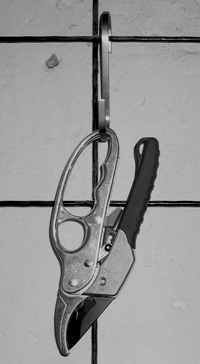All Change Please
 Last Friday I was in the garden, standing alone in front of what was left of an unruly looking rose plant, holding a pair of secateurs. I had been eyeing it out of the kitchen window for a couple of weeks already, mentally snipping off its long, straggly last-year's growth as I washed up the saucepans and cups, but the actual pruning was proving far more difficult.
Last Friday I was in the garden, standing alone in front of what was left of an unruly looking rose plant, holding a pair of secateurs. I had been eyeing it out of the kitchen window for a couple of weeks already, mentally snipping off its long, straggly last-year's growth as I washed up the saucepans and cups, but the actual pruning was proving far more difficult.
Normally, if I need a piece of advice on the garden, I'll pick up the phone and ring my mother. But we live in different climate zones, so in the springtime, while I'm standing frustrated in front of a dwindling group of brave winter hardies, my mother's garden will look much the same as it did in autumn: mild and unchanging. But then that's England all over. Mild and unchanging.
Transportation of ourselves and our words has become so easy that I mostly manage to forget quite how far away I live from the rest of my family. But in spring, it's the garden that reminds me.
'Sorry,' says my mother down the phone – as clearly as if she was next to me. 'I don't know what you should be doing with the garden now. What about your neighbours, why don't you ask them?' I think about the neighbours using a spirit level to plant their hedge (or Sichtschutz – screen – as it's often known here); their military rows of bulbs and symmetrical flower beds.
 One answer to the continental climate popular amongst our neighbours is the 'flower shop' style of gardening: a burst of pink, yellow, light blue, lilac and orange, lifting crinoline skirtfuls of blossom for the bees; thick, thirsty light-green leaves and stems shooting high around terrace seating and neat sun umbrellas. Garden terrace and garden seem to appear at the same time. And indeed for many a German they are an incontrovertible unity. But how do I begin to explain to a flower shop gardener a longing for a herbaceous border? How do I admit a need for unpredictability to the symmetrical planter? Clearly, I will have to go it alone.
One answer to the continental climate popular amongst our neighbours is the 'flower shop' style of gardening: a burst of pink, yellow, light blue, lilac and orange, lifting crinoline skirtfuls of blossom for the bees; thick, thirsty light-green leaves and stems shooting high around terrace seating and neat sun umbrellas. Garden terrace and garden seem to appear at the same time. And indeed for many a German they are an incontrovertible unity. But how do I begin to explain to a flower shop gardener a longing for a herbaceous border? How do I admit a need for unpredictability to the symmetrical planter? Clearly, I will have to go it alone.
'What do you want?' The post-winter rose is frustratingly unresponsive. 'Water? Fertiliser?... Shortness?' I click my secateurs at it. When it's not looking like an upside-down shrivelled, green octopus, this rose is covered with heavy clusters of small, white flowers with multiple rows of petals and delicate leaves. It said on the pot it was a bush rose, but two years later, it's very clearly a climbing rose – some Scherzkeks at the shop must have thought it was funny to change the labels. I try a bit of empathy: If I were a climbing rose, left to flail for two years – falsely apprehended and misunderstood – what would I want?' My secateur arm drops. This plant makes me feel sad. Who am I to start chopping bits off it, when it's had such a contrary life already. I should be happy it's bothering to do anything at all. So I pull off the gardening gloves and hang the secateurs in the cellar. Later on, I discuss this non-pruning-event with my husband. He says something like, 'You're thinking about it the wrong way around. It's not about the rose. What do you want?'. I throw my hands up in frustration. 'I want a bush rose! I always wanted a bush rose'.
'I've been busy in the garden' I tell my mother later on the phone.
'Really? So have I', she says, sounding brusque and pleased, as if she has just come in from a long windy moorland walk.
'Pruning?' She asks.
'Yes,' I say.
'That's funny, so was I.'
'I was trying to sort out this rose we've got that's supposed to be a bush rose...' I venture.
'Ah, your Cecile Brunner, I remember. How did you do?'
Cecile what?
'Well, I tidied it up a bit anyway,' I say, wondering why roses need surnames. I pause.
'I think I did alright. How are things with you?' I ask.
'Oh – not much change here.'

Photo credits: Fiona Mizani

